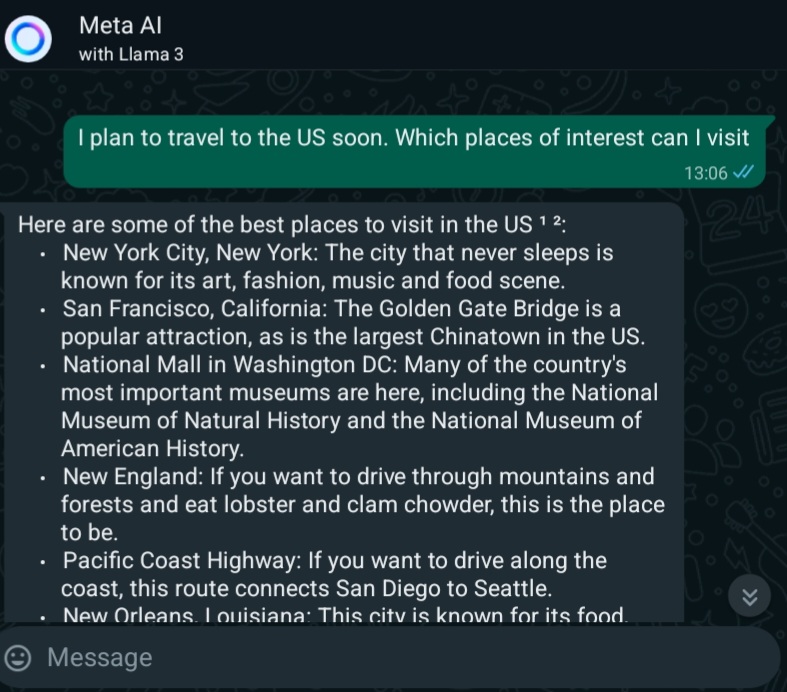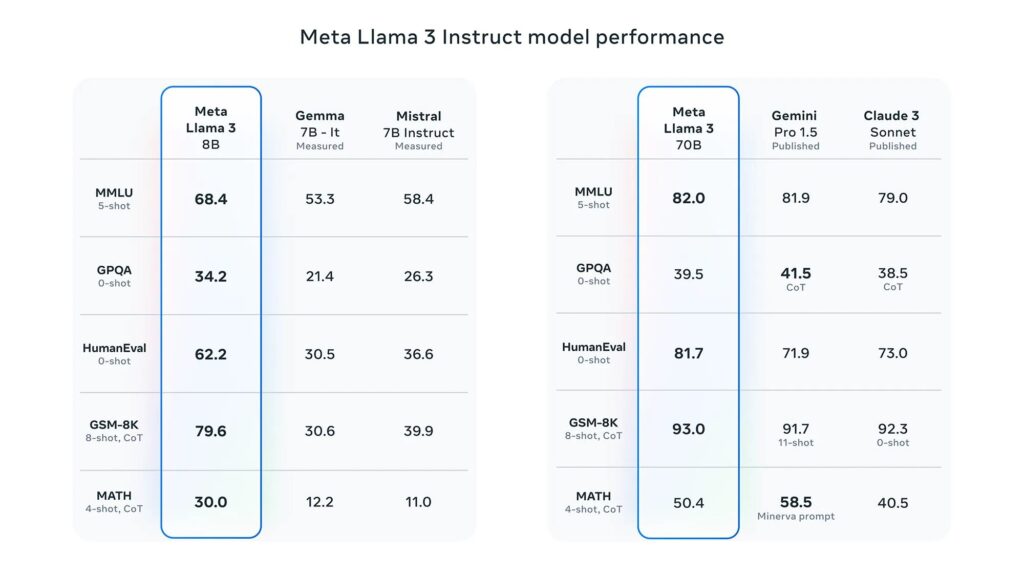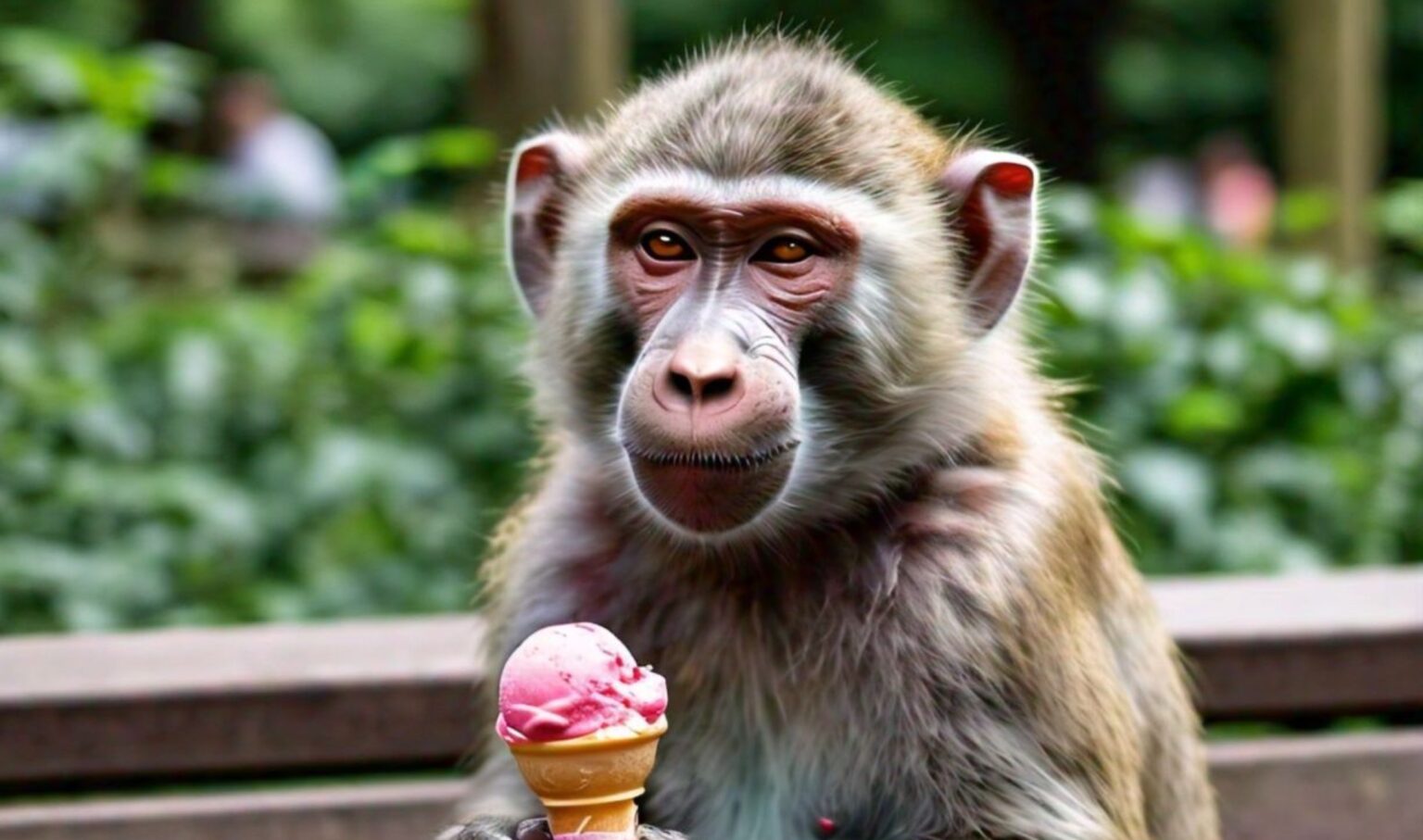Meta Platforms, the company previously known as Facebook, rolled out its Llama3-powered AI chatbot feature on WhatsApp to users in more countries in the last few weeks, creating a buzz.
WhatsApp users in the U.S. have already been using the AI tool in beta for months. With the update, Meta AI is promising a new layer of interaction for its three billion WhatsApp users worldwide.
As the company tries to establish dominance in the generative AI market against OpenAI and Google, its new chatbot and AI search tool on WhatsApp might just give ChatGPT a run for its money.
Also read: Meta Brings Major AI Upgrade to its Ray Ban Glasses
What can you do with Meta AI?
Meta CEO Mark Zuckerberg said Meta AI is supported by the firm’s new large language model Llama 3. The AI is not only being added to WhatsApp, but also several of Meta’s products like Facebook and Instagram, as well as getting its own dedicated website.
“We’re upgrading Meta AI with our new state-of-the-art Llama 3 AI model, which we’re open sourcing,” Zuckerberg wrote on Threads, announcing the features. “With this new model, we believe Meta AI is now the most intelligent AI assistant that you can freely use.”
The ability to talk to an AI assistant directly in WhatsApp isn’t only fascinating, but also one of Meta AI’s strongest selling points: it offers users convenience and easy access within the familiar interface of the popular messaging app.
To access the tool, open your WhatsApp, move to the chat screen, click the ‘New chat’ button and then select ‘Meta AI’. The feature sits on the top left of your chat screen. Some users can access it via the ‘blue-ish’ Meta AI icon ring to the right of your existing chats.
Tap the ring to initiate a conversation with the chatbot. You will need to update your WhatsApp to the latest version to gain access to Meta AI. Once you’re set, you can start interacting with the AI assistant as you would with your friends or family on WhatsApp.
Meta AI offers text responses and the ability to generate images. Like ChatGPT, you can ask the chatbot about anything including things like weather or nearby restaurants, and it will surface a real-time response from the web, sometimes with sources.

Convenience and accessibility
As seen in the screenshot above, we asked Meta AI to recommend places of interest to a tourist from Africa visiting the United States and it replied with a list of suggestions, including The Golden Gate Bridge in San Francisco and the National Mall in Washington DC.
We asked the AI many things, including the war in the Middle East, and it gave a detailed and accurate account of the recent conflict between Iran and Israel. The tool, powered by Meta’s new Llama 3 model, can write poetry and solve complex math problems. Llama 3 performed better than competitors Gemini Pro 1.5 and Claude 3 in “leading reasoning and math benchmarks,” Zuckerberg said.

WhatsApp’s Meta AI is a novel tool that allows users to use simple text prompts to get information without switching between apps. A message to Meta AI gets you the information you’re looking for right inside your chat window within seconds, which is better than nagivaging a web browser for searches. The tool is convenient and readily accessible to many people, who can use it for free for now.
This ease of use separates Meta AI from many of its rivals, such as ChatGPT or Gemini, making it a handy search tool and personal assistant for everyday tasks. Both ChatGPT and Gemini are mostly web-based. ChatGPT has a mobile app, but that also means using a different app for probably search, and certainly text messaging.
Meanwhile, Zuckerberg said Meta AI is getting its own website, in addition to being embedded on WhatsApp and Facebook.
However, Meta AI on WhatsApp is only available in English, which limits its reach and appeal. The chatbot is also prone to providing useless, but not necessarily inaccurate information. For example, we asked the AI, “what is the most topical issue in Zimbabwe right now?” (which should be the southern African country’s new gold-backed currency called the ZiG).
Meta AI responded with the sorry story of a vendor only identified as Chenai who sells vegetables for a living in the streets of Harare. The failure speaks to the type of data used to train the AI model, which appears to mostly exclude that from this part of the world. While touching, Chenai’s story is not a topical issue in the country.

Meta AI generates images
One of the most talked about features of Meta AI is its ability to generate images within WhatsApp using text prompts.
To create an image, open the chat where you want the image sent, type ‘@’ in the message field and select ‘Meta AI’ from the list of suggestions that pop up. After this, type the forward slash (/) and select ‘Imagine’. Enter the text prompt describing the image you want generated and send. The image is created below your prompt.
I asked the generative AI tool to generate several different images, including one featuring a baboon eating ice cream as you can see above. All images bear a Meta AI watermark on the lower left side, which is supposedly meant to help cut down on misuse.
The images look impressive at first glance, but there are glaring deficiencies when you examine the picture more closely. Apart from being repetitive, Meta AI often got the spellings wrong for images containing text in them. In others, it was unintelligible.
In one image I got from my wife, which she generated in WhatsApp using Meta AI for a goodnight message, it said: “I love you mie nore more than anytthing in this worrldd. Sleep tight, dear. My dear.” Mie nore, what is that?
In another, I prompted the AI to generate an image of an elephant bouncing on its tusk on the moon (see below). Meta AI created an image of an elephant that appears to be stomping the sandy surface beneath its feet with the moon as the backdrop. The moon itself is not as spherical and seems to extend out of shape to the right.
The images generated by Meta AI also fell short in other aspects such as the lack detail (in one image, the elephant’s skin, known to be rough, was extremely shiny and smooth), appearing more like abstract interpretations rather than true representations.

Turn it off
There’s no doubt that Meta Platforms will continue to improve the image generator, underpinned by Llama 3, in order for it to create images that are more realistic, without shouting AI. In his post on Threads, Zuckerberg said the company was already doing this for users in the U.S.
“We built some unique creation features, like the ability to animate photos,” he said. “Meta AI now generates high quality images so fast that it creates and updates them in real-time as you’re typing. It’ll also generate a playback video of your creation process.”
Meanwhile, some users urged Meta to give them the choice to opt out of Meta AI on WhatsApp.
“You used to have to pick through pages of garbage search results to find a legit source of information, but now, thanks to AI, you can pick through garbage autotext to find the top two or three garbage search results,” said one user, replying to Zuckerberg’s post.
Another retorted: “How about letting us opt out?”
Some people complained about copyright violation. “Well it’s [using AI in WhatsApp or Facebook] stealing content from creators without attribution and confusing the communities we spent years building. Safe to say, we hate it.”









 and then
and then